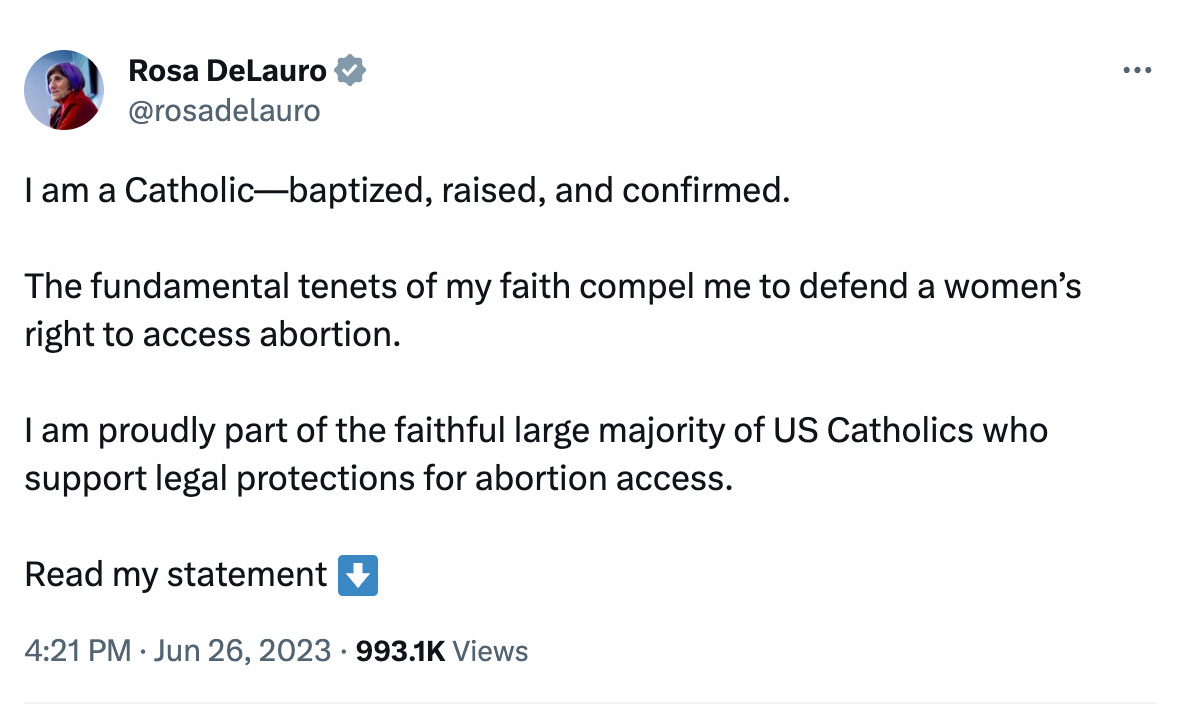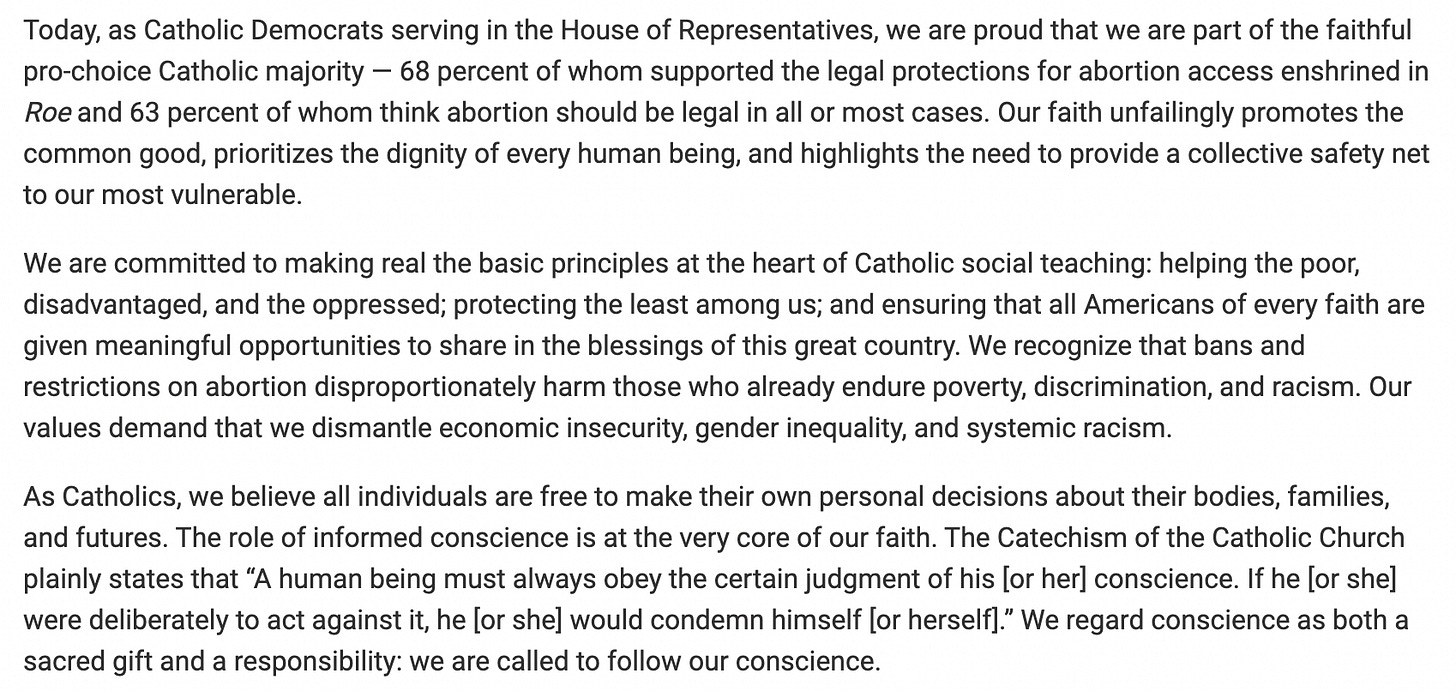Meth-Fueled BDSM Orgies Are the Truest Expression of My Deeply Held Religious Faith
when lawmakers explain themselves
Rosa DeLauro, a Connecticut Democrat who has been serving in the House of Representatives since the Sierra Nevadas were a gleam in Pangaea’s eyes, explained today that support for abortion is the truest expression of her devout Catholicism:
She had company, joining a statement released by “over 30 Catholic Democrats in the U.S. House of Representatives.” Here’s the heart of the thing, hinting at complete support for abortion on demand — “all or most cases” — through all terms of pregnancy:
There’s an especially interesting moment in the first paragraph, if you caught it.
Weirdly, the Catholic Church disagrees with the Catholic lawmakers, in the same catechism that apparently says to always just obey your own personal conscience:
2270 Human life must be respected and protected absolutely from the moment of conception. From the first moment of his existence, a human being must be recognized as having the rights of a person - among which is the inviolable right of every innocent being to life.
Before I formed you in the womb I knew you, and before you were born I consecrated you.
My frame was not hidden from you, when I was being made in secret, intricately wrought in the depths of the earth.
2271 Since the first century the Church has affirmed the moral evil of every procured abortion. This teaching has not changed and remains unchangeable. Direct abortion, that is to say, abortion willed either as an end or a means, is gravely contrary to the moral law:
You shall not kill the embryo by abortion and shall not cause the newborn to perish.
God, the Lord of life, has entrusted to men the noble mission of safeguarding life, and men must carry it out in a manner worthy of themselves. Life must be protected with the utmost care from the moment of conception: abortion and infanticide are abominable crimes.
2272 Formal cooperation in an abortion constitutes a grave offense. The Church attaches the canonical penalty of excommunication to this crime against human life. "A person who procures a completed abortion incurs excommunication latae sententiae," "by the very commission of the offense," and subject to the conditions provided by Canon Law. The Church does not thereby intend to restrict the scope of mercy. Rather, she makes clear the gravity of the crime committed, the irreparable harm done to the innocent who is put to death, as well as to the parents and the whole of society.
2273 The inalienable right to life of every innocent human individual is a constitutive element of a civil society and its legislation:
"The inalienable rights of the person must be recognized and respected by civil society and the political authority. These human rights depend neither on single individuals nor on parents; nor do they represent a concession made by society and the state; they belong to human nature and are inherent in the person by virtue of the creative act from which the person took his origin. Among such fundamental rights one should mention in this regard every human being's right to life and physical integrity from the moment of conception until death."
"The moment a positive law deprives a category of human beings of the protection which civil legislation ought to accord them, the state is denying the equality of all before the law. When the state does not place its power at the service of the rights of each citizen, and in particular of the more vulnerable, the very foundations of a state based on law are undermined. . . . As a consequence of the respect and protection which must be ensured for the unborn child from the moment of conception, the law must provide appropriate penal sanctions for every deliberate violation of the child's rights."
2274 Since it must be treated from conception as a person, the embryo must be defended in its integrity, cared for, and healed, as far as possible, like any other human being.
Prenatal diagnosis is morally licit, "if it respects the life and integrity of the embryo and the human fetus and is directed toward its safe guarding or healing as an individual. . . . It is gravely opposed to the moral law when this is done with the thought of possibly inducing an abortion, depending upon the results: a diagnosis must not be the equivalent of a death sentence."
By the most remarkable coincidence, though, Catholic Democrats find that their two systems of ideals overlap completely. Catholicism is redistributing income; Christian faith is primarily focused on economic collectivism, but unrestricted late-term abortion happens to be in there too.
My very last post here described “a cultural context in which all behavior becomes equally meaningless,” and here’s a confident expression of Catholic faith as a shopping basket full of whatever you put in it as you stroll through the aisles: Jesus says to go in for a D&C, we promise. Everything is flattened; you can be X and Not X simultaneously, casually believing whatever contradictions work for you this morning.
1.) I am Catholic;
2.) I believe [this thing];
3.) Therefore, Catholicism is located in the act of believing in [this thing].
You’re the doctrine. What you happen to believe is the church. If you believe that your sins are forgiven because you eat ice cream, then your sins are forgiven when you eat ice cream. If it weren’t so, why would you believe it? For thirty Catholic Democrats, the formal doctrine of their church isn’t even a speedbump. “Don’t do that,” their church says, as they roll on by on the highway to doing exactly that. In the fast lane.
All culture is consumer culture. Islam is about…feeling good? Judaism is about…doing what turns you on? Catholicism is having abortions. Symbol-thing is a shell that contains whatever meaning you pour inside it, devout Catholic third-term abortion. You can consume all the different symbolic shells at one sitting without indigestion, because they’re all equally meaningless. “My Baptist faith blesses the full-on hotness of autoerotic asphyxiation,” he says, wrapping a belt around his neck.
By the way, the thirty Catholic Democrats explain that the Catechism of the Catholic Church says that every person must obey “the certain judgment of his [or her] own conscience.”
But here’s the whole paragraph:
1790 A human being must always obey the certain judgment of his conscience. If he were deliberately to act against it, he would condemn himself. Yet it can happen that moral conscience remains in ignorance and makes erroneous judgments about acts to be performed or already committed.
They edited the doctrine of their church to remove the possibility of moral error. Please take a moment to imagine my current facial expression.





To put this a little differently, all identities are compatible with all actions. You can't violate the doctrine of a church if you just say that your actions don't violate it. "Nothing is true; everything is permitted." What you do has nothing to do with what you are, which is purely declarative.
I’m essence, you get to declare yourself God and make your own rules. Super convenient. Exactly like the Book of Judges in the Old Testament, “everyone did what was right in there own eyes”. Humankind’s m.o. since the Garden of Eden.